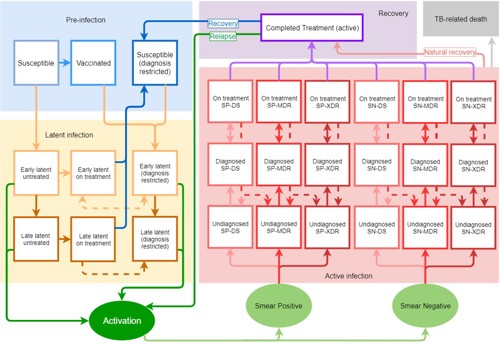Access Optima TB
Open web appBurnet Institute, the World Bank Group
Burnet Institute, the World Bank Group
Burnet Institute, the World Bank Group
National TB Program Mozambique, World Bank, University College London, Burnet Institute
Optimizing investment in Romania's tuberculosis response (2019)
Burnet Institute, the World Bank Group
Optimizing investments in Moldova’s tuberculosis response (2018)
Burnet Institute, the World Bank Group, IMSP Phthisiopneumology Institute, PAS, Ministry of Health Moldova
Optimizing investments in Belarus’ tuberculosis response (2017)
The World Bank Group for the Government of Belarus
Optima TB helps to:
- Determine the best allocation of resources to achieve disease reduction and elimination goals
- Project trends associated with different levels of program funding at the national and subnational level
- Identify the optimized allocations of available funding to achieve the greatest health impacts based on the user’s health goals
- Facilitate policy scenario analyses to explore how TB funding can be more efficiently allocated across detection, prevention, and treatment services
- Explore the capacity required for service and diagnostic modalities towards achieving health targets.
The software also addresses specific questions tailored to local settings such as:
- What are the priority approaches to identify and reduce the prevalence of drug-resistant strains of TB in my priority districts?
- What is the best combination of TB-related services for populations co-infected with HIV and TB attending my network of facilities?
To access the Optima TB open source model, click here. Access the user guide and training materials in the relevant dropdown on this page.
Optima Tuberculosis (TB) combines an epidemiological model with Optima’s economic modelling approach and optimization algorithm to identify the most efficient ways to prioritize resources to reach country goals.
2015 – ongoing
The primary Consortium partners for developing and applying the Optima suite of tools are University College London, University of Bern, and the University of New South Wales.
Optima tools have been developed and applied in close partnership and with funding from global health agencies including the: World Bank, Global Fund, and the U.S. Centers for Disease Control. Optima also receives funding from the Australian National Health and Medical Research Council.

Funding
Partners
- World Bank
- Global Fund to Fight AIDS, Tuberculosis and Malaria
- U.S. Centers for Disease Control
Partners +
Collaborators
- University College London
- University of Bern
- University of New South Wales
Project
Team
Meet the project team. Together, we are translating research into better health, for all.





